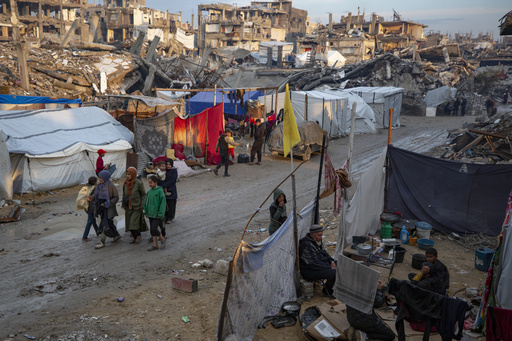
CAIRO — Hamas announced on Thursday its intention to release three additional Israeli hostages as part of an ongoing strategy to address the ceasefire conflict within the Gaza Strip.
Although the militant organization initially threatened to postpone the scheduled release, accusing Israel of not upholding its commitments regarding the provision of tents and shelters, this latest announcement is expected to help maintain the current ceasefire. Israel has previously indicated that it would resume military actions should the hostages not be freed, though they did not comment directly on Hamas’s statement.
The release of the hostages by Hamas opens the door for the continuation of the ceasefire, despite some recent tensions, including a report from Israel claiming a rocket was launched from Gaza.
Israeli Prime Minister Benjamin Netanyahu held meetings with military and security leaders at the army’s Southern Command, located near the Gaza border, to discuss ongoing strategies.
Hamas reportedly engaged in discussions in Cairo with Egyptian officials and has been coordinating with Qatar’s prime minister concerning their demands for additional supplies in Gaza, including shelters, medical resources, fuel, and machinery for debris clearance. In a public statement, Hamas noted that these intermediaries had promised to “eliminate all obstacles” to aid delivery.
Shortly after this announcement, Hamas spokesperson Abdul Latif al-Qanou confirmed via phone that the three hostages would be released on Saturday.
Egyptian state media, closely tied to governmental security services, indicated that both Egypt and Qatar had played crucial roles in mediating between the sides and resolving their disputes. Having acted as intermediaries for the ceasefire that commenced in January, these nations have been vital in the peace efforts after over 15 months of conflict. Reports and footage from Egyptian media showed trucks equipped with temporary housing and construction equipment stationed at the Rafah border crossing, suggesting that supplies were poised for inspection before entering Gaza.
With the ceasefire currently holding, the Israeli military acknowledged that a rocket had been fired from Gaza, marking what appears to be a rare violation of the agreement. The projectile landed within Gaza, and the military later confirmed they targeted and struck the launcher responsible for the attack.
Since the ceasefire’s initiation, fatalities in Gaza have risen as a result of Israeli military actions, with claims of at least 92 Palestinians killed and over 800 injured, according to Gaza Health Ministry officials. The Israeli military has justified its actions by stating it is responding to individuals who approach military positions or violate designated areas under the truce.
Looking ahead, the ceasefire faces significant challenges as the first phase nears completion in early March with no substantive negotiations in sight for a second phase. This second phase would involve Hamas releasing more hostages in exchange for the cessation of hostilities. Additionally, recent proposals from U.S. President Trump have introduced further complications, advocating for the relocation of approximately 2 million Palestinians from Gaza to different countries. This suggestion has been met with strong opposition from both Palestinian authorities and neighboring Arab nations, raising international legal concerns regarding potential war crimes.
Turkey’s President Recep Tayyip Erdogan expressed serious concerns about the implications of Trump’s proposals, labeling his actions a threat to global stability. He publicly criticized Trump’s approach, indicating that it does not reflect positive developments in international relations.
In a similarly inflammatory response, Yemen’s Houthi leader Abdul-Malik Al-Houthi warned of military action against any attempts to implement this plan.
Netanyahu’s associates from far-right factions are already pushing for a resumption of military operations to pursue Trump’s relocation plan and obliterate Hamas, which has remained resilient throughout the conflict.
The current war began on October 7, 2023, when militants affiliated with Hamas attacked Israel, resulting in the deaths of around 1,200 individuals, predominantly civilians, and the abduction of 251 others. Since then, various agreements have led to the release of over half of those initially taken captive.
As dialogue surrounding future negotiations mounts, the remaining 73 hostages present a slim bargaining power for Hamas, especially if the threat of renewed conflict looms.
President Trump’s mixed messages regarding Gaza’s future appear to intensify the uncertainty surrounding the truce, as he claims credit for the ceasefire achieved shortly before taking office while expressing skepticism about its effectiveness.
According to the Gaza Health Ministry, the ongoing conflict has claimed the lives of over 48,000 Palestinians—including high proportions of women and children—though they refrain from specifying how many were combatants. In contrast, Israeli authorities report approximately 17,000 militant casualties, but evidence to substantiate these claims remains unverified.
The repercussions of the offensive have left extensive devastation in Gaza, displacing up to 90% of the population at its peak. Although many are returning to their residences following the ceasefire, they are often met with ruined landscapes, missing persons, and unexploded munitions in their neighborhoods.

